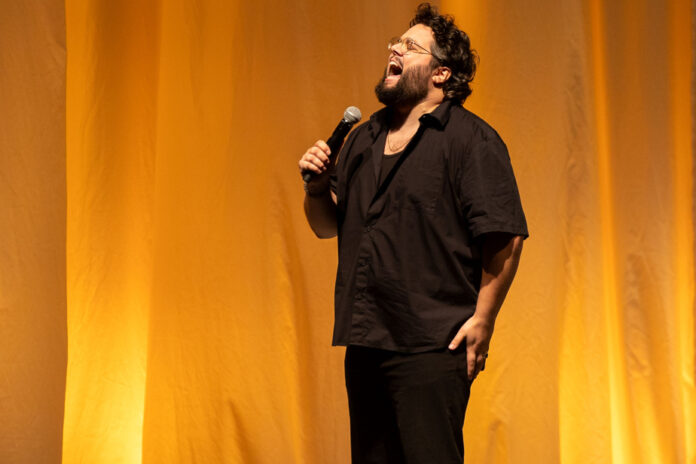As Waiting for the Village Party progresses, Matthieu Pepper reveals the extent of his comic range. His first show has the same effect as a generous hug.
Matthew Pepper’s late father was the type to exclaim with joy at the sight of a lilac in bloom. And his son is of the same species: although he uses irony abundantly, the reactions that all forms, more or less serious, of human stupidity arouse in him are less of irritation than of wonder. .
Matthieu Pepper cannot believe that we are so stupid, so proud, so incapable of telling ourselves the proverbial true things. Matthieu Pepper can’t believe that the human race saw fit to invent so many kinds of bread. Matthieu Pepper generates a lot of laughter by exaggerating the confusion caused by the absurdities uttered to him by the doctor, the lady tasting at the supermarket or his mother.
But Matthieu Pepper, worthy heir of his father, chooses to have fun with it. It is not uncommon for laughter to take hold of him between the premise and the punch of his jokes.
Presented Tuesday at the Olympia, En attendant la fête au village, his first show, unfolds like a crescendo, the evening beginning with a few numbers during which the comedian resembles a pianist practicing his scales, just to show what of which he is capable.
Childhood, adolescence, beginning of adult life: these are all the imposed figures of a first comic work, which Pepper acquits with a solidity well based on his extensive experience of the stage – in addition to hosting at the Brothel, he since 2017 he has provided opening acts for several friends. Whether he talks about his kindergarten or those long years when he wet the bed, the 33-year-old shines, but until then, without surprising.
En attendant la fête au village goes beyond the boundaries of a first comedy show when its creator weighs in on the subject of sexuality from an angle that contrasts with the more frontal perspective of many of his colleagues. By urging members of the public to take care of the grammar and spelling of the naughty messages they send, Matthieu Pepper sets himself up as an ayatollah of the language of sexting, let Guy Bertrand take it for granted.
The jubilant moment during which he wonders if he should put an s to a rather prank word, beyond its profound humor, encapsulates many things about our host. Although he claims to have “got used to disappointing the world”, his smile always seems to hide a fear of not being up to the task, a palpable sensitivity infusing his jokes, even the lightest ones, with a sort of extra soul. .
If the toxicity of a certain masculinity has been examined a lot in the media, and on stage, over the last few years, Matthieu Pepper has nevertheless managed to draw many original observations from it – we too were unaware that there are chips more manly than others. The crescendo on which his show is built begins its ascent halfway through as he evokes the desire that has long inhabited him to have a father different from his own.
This is because, described as a pink man, Papa Pepper liked to inquire about his son’s emotions and to take care of the household chores, an attitude at odds with that of the boorish and vaguely homophobic fathers that the boy met at his friends’ houses. .
One day, when he was a teenager, Matthieu Pepper asked his father to accompany him to a monster truck event at the Olympic Stadium, even though he knew only too well that neither his father nor himself would attend. would please. Pepper father and son finished their outing at the Botanical Gardens, a place that suited them both much better.
Waiting for the village party provides an effect similar to that provided by the Botanical Garden to its creator, and could thus be described as a comforting spectacle, in the same way that we speak of a feel-good movie. Matthieu Pepper is the archetype of a good mainstream comedian, who respects the intelligence of his audience enough not to reinforce their prejudices, but without ever shocking.
The end of the show, in which he confides in the subject of his obsession with death, before recounting that of his father, could have provided him with sufficient material for a full hour, as he manages to inject light into this theme. , while avoiding truisms.
Despite a long passage in which he imagines Champlain and Cartier learning in the afterlife how they were paid homage after their death, this twenty minutes alone contains the promise of a rich career.
“Keep me in your arms longer,” Matthieu’s father once asked his son, who was helping him move, in his room at a palliative care center. You will find in this show the generous hug you may need.















